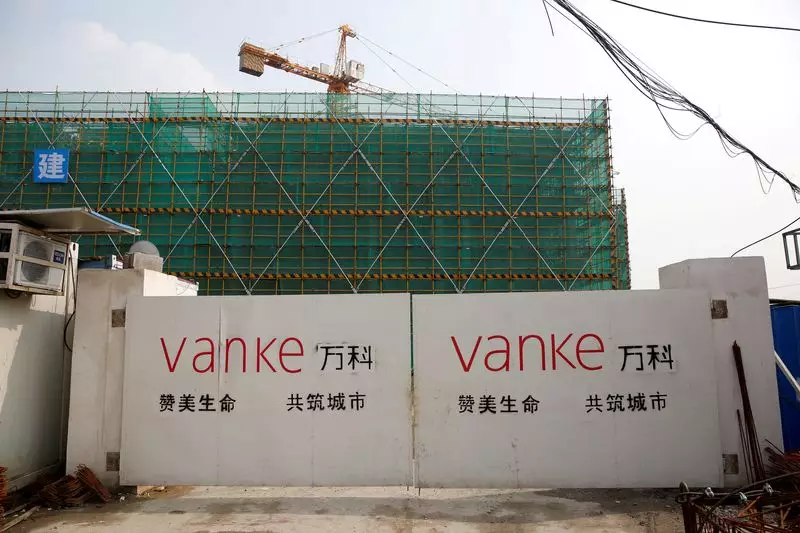China’s real estate sector, once a cornerstone of its economic miracle, is now struggling under the weight of a liquidity crisis that appears to be deepening. For nearly five years, the shadow of financial instability has loomed over the industry, triggering a series of troubling developments for one of its most prominent players, China Vanke. This article evaluates Vanke’s current predicament and the looming implications for the broader property market, government policy, and public sentiment.
The Crisis at Hand: Vanke’s Concerning Developments
Recent revelations have heightened worries regarding Vanke’s financial stability. Reports surfaced alleging that the CEO was detained, igniting speculation about a potential takeover or restructuring. Despite government control of state-backed organizations, such instability is alarming, particularly for a developer that has historically been considered a benchmark within the sector. The news, swiftly removed from state media, signals an urgency in addressing Vanke’s deteriorating situation, preventing panic amongst homebuyers and investors alike.
The scale of Vanke’s financial struggles is underscored by its staggering debt load, estimated at approximately 331.3 billion yuan ($45.21 billion) as of mid-2023. As the company approaches critical repayment deadlines—most notably a January payment of yuan-denominated debt and a total of $3.4 billion due within the year—the pressure mounts. Rating agencies have responded by slashing Vanke’s credit rating deeper into junk territory, reflecting a growing consensus that a default seems increasingly inevitable unless substantial liquidity is injected into the company soon.
Concern regarding Vanke’s troubles echoes across the financial landscape, potentially eroding the fragile homebuyer confidence that had recently shown signs of recovery. As Vanke grapples with plummeting sales that fall short of break-even, banks risk tightening their lending criteria, which could compound the challenges faced by developers steadfastly attempting to navigate the turbulent waters of the real estate market.
Feedback from industry analysts indicates that Vanke’s reputation in the property sector makes it a bellwether; should it falter, the ramifications could extend well beyond its own balance sheet. The notion of a contagion effect, where confidence falters and the trend of debt defaults intensifies, raises alarm bells across the industry. Simply put, the implications of Vanke’s financial malaise could reverberate through the financial system, threatening other property developers who have so far managed to remain afloat.
Potential Government Intervention: A Double-Edged Sword
What’s at stake is not merely Vanke’s survival; it’s the integrity of a sector that has long been viewed as too big to fail. Analysts propose that the Shenzhen municipal government could intervene, possibly leading to a state rescue effort aimed at stabilizing the company’s outlook. Such an intervention could take various forms, including asset sales and lending via state-backed entities, but it might not equate to outright capital injections, raising questions about the effectiveness of any rescue package.
The case of China Evergrande serves as a cautionary tale. Its struggles culminated in liquidation proceedings, demonstrating the potential pitfalls of mishandling corporate debt crises. Should Vanke’s struggles precipitate a similar governmental response, it risks setting a precedent that might encourage reckless borrowing behavior among other developers, creating moral hazard issues.
Stabilizing Vanke could represent a landmark moment for the Chinese government, offering a chance to reaffirm its commitment to buoying the real estate sector amid growing challenges. Regulatory bodies may view a clear government bailout as a pivotal step in demonstrating their resolve to restore faith within the housing market, thereby reinstating buyer confidence and ensuring the completion of pre-sold homes.
However, the fundamental question remains whether the government can exercise the necessary restraint to navigate this crisis without exacerbating the existing economic fragility. If Vanke defaults without prompt governmental intervention, the fallout could jeopardize years of efforts aimed at fostering industry stability.
The fate of China Vanke encapsulates the precarious ongoing struggle in the nation’s real estate sector—a storyline that encompasses rising debts, fragile buyer confidence, and the imminent specter of governmental intervention. As the situation unfolds, stakeholders will be closely monitoring developments, anticipating both the challenges and the opportunities that lie ahead.

